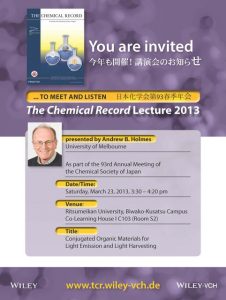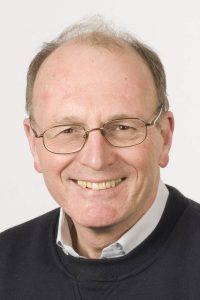Solar cells about the size of an A3 paper has been fully printed using a newly installed large scale printer in CSIRO. The hope is that one day organic solar cells can be placed on building walls or household rooftops. More information: http://csironewsblog.com/2013/05/16/ctrlp-printing-australias-largest-solar-cells/
Welcome to Francois Grenier from Mario Leclerc‘s group in Université Laval. Francois is on a student exchange program and will be with us for 6 months. He will be working on direct heterarylation polymerization reactions for photoactive polymers in organic solar cells.
David was featured in the Age (22 March 2013 issue) article “Ideas that could change your life by 2013”. The article describes the Victorian Organic Solar Cell Consortium (VICOSC) coordinated by Dr David Jones and its goal towards fully printable A4 sized flexible organic solar cell modules. Full article is available at http://www.theage.com.au/lifestyle/ideas-that-could-change-your-life-20130312-2fxo6.html.
Prof Andrew Holmes has been selected as the The Chemical Record (TCR) Lecturer in the upcoming Chemical Society of Japan Annual Meeting (click on the picture to see the invitation)! Also, Prof Holmes will be the Nozoe Memorial Lecturer at the ISNA in Taipei, Taiwan in July 2013. Congratulations and safe trips Andrew!

The Australian Solar Institute has announced major research grants to support solar energy research. Congratulations to the organic photovoltaic researchers in the School of Chemistry (Andrew Holmes, David Jones, Ken Ghiggino) who will form a node of the new $33 million US-Australia Institute for Advanced Photovoltaics. This Institute’s objective is to develop the next generation of photovoltaic technology and involves participation from key research groups in USA and Australia Universities, research organisations together with industrial supporters. Further information is available at http://australiansolarinstitute.com.au/media-releases/.aspx
Prof Andrew Holmes got interviewed by Robyn Williams in his program the Science Show. Andrew discussed his contributions in the organic electronics research area, especially in organic solar cells and light-emitting diodes, which led him to be awarded the prestigious Royal Medal Award. He further commented on the the role Australia plays in the development of wide-area organic solar cells and its current breakthroughs and challenges. Further information at http://www.abc.net.au/classic/content/2012/08/08/3562409.htm
Australian scientist awarded a Royal Medal from the Royal Society London
Internationally recognised chemist Professor Andrew Holmes has been awarded a 2012 Royal Medal – the only Australian in 10 years to receive the award.
 Three Royal Medals, also known as the Queen’s Medals, are awarded annually for the most important contributions in the physical, biological and applied or interdisciplinary sciences. Former recipients include Charles Darwin, Francis Crick and Suzanne Cory.
Three Royal Medals, also known as the Queen’s Medals, are awarded annually for the most important contributions in the physical, biological and applied or interdisciplinary sciences. Former recipients include Charles Darwin, Francis Crick and Suzanne Cory.
Professor Holmes is a University of Melbourne Laureate Professor of Chemistry at the Bio21 Institute, a CSIRO Fellow and a Distinguished Research Fellow at Imperial College London.
He is recognised for his contributions at the interface of the materials and biological sciences that will lead to outcomes that will benefit society. He played a pioneering role in the field of applied organic electronic materials.
In the late 1980’s he established a collaboration with University of Cambridge physicists that in 1990 led to the discovery of light emitting polymers. Professor Holmes led the Chemistry team in that collaboration for 14 years. These polymers have applications in solid state (LED) lighting, flat panel displays, transistors and solar cells.
In Australia Professor Holmes leads the Victorian Organic Solar Cells Consortium involving the University of Melbourne, CSIRO, Monash University and industry partners. The Consortium aims to deliver efficient flexible printed solar cells for low cost applications in electricity generation and benefits from a strong collaboration with the Imperial College Doctoral Training Centre in Plastic Electronics.
Professor Holmes said it was an honour to receive this award and be recognised in the area of organic electronic materials and for collaboration with cell biologists.
“It’s exciting to work in polymer chemistry, an area that can lead to a diverse range of applications from the development of more energy efficient products to the greater understanding of biological processes. Having a strong international collaboration at Imperial has also strengthened our opportunities abroad,” Professor Holmes said.
Dr Calum Drummond, Executive of CSIRO’s Manufacturing, Materials and Minerals Group said, “I am delighted that the Royal Society has awarded Andrew this very prestigious medal in recognition of his immense contributions to materials chemistry and its application to energy efficient and sustainable products, as well as bio-related applications.
“CSIRO greatly values the role that Professor Holmes has played in bringing together university groups and CSIRO to conduct research in areas that have the potential to provide enormous economic, social and environmental benefit for Australia.”
Bio21 Institute Director, Professor Tony Bacic congratulated Professor Holmes’ exemplary career.
“Professor Holmes’ commitment to interdisciplinary research, innovation and leadership has held him in high esteem amongst his peers, the University and the broader research community. This is a great honour and acknowledgement of Professor Holmes’ commitment and recognition of an outstanding career,” he said.
The Royal Medals were founded by His Majesty King George IV in 1825 and are awarded annually by Her Majesty The Queen on the recommendation of the Council of the Royal Society. Professor Holmes will be presented with the Medal at the Royal Society’s Anniversary Day meeting in November 2012.
In addition to his current appointments, Professor Holmes is a Director and Innovation Fellow of VESKI (Victorian Endowment for Science, Knowledge and Innovation) and Foreign Secretary of the Australian Academy of Science.
PhD student, Mark Gregory, has recieved both the Overseas Research Experience Scholarship (ORES) and the Agilent/Bio21 International NMR Travel Award totaling over $5,500. Mark will be heading to the Chemistry department at the University of Oxford for a 3 month period later in the year to continue work with the Conway Group and develop new links with the Schofield Group.
Scientific research doesn’t proceed within countries unconnected as if isolated islands. It is a worldwide collaboration. And for success, countries must be part of this collaboration. Andrew Holmes and Nobel Laureate Brian Schmidt feature in this public forum hosted by the University of Melbourne and The Australian Academy of Science discussing the value of scientific research and the way the worldwide collaboration strengthens everyone involved.
Read More

